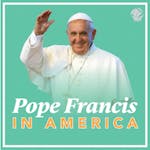
Pope Francis addressed a joint session of Congress on Thursday morning. He cited four historic Americans and reminded the assembled politicians that they "are called to defend and preserve the dignity of your fellow citizens in the tireless and demanding pursuit of the common good." Here are the the highlights from the speech, with insights from New Republic writers and editors on our live blog. Read Francis's full remarks here.
He Barely Mentioned Climate Change
Francis quoted some of his encyclical on the environment, but didn't say the words "climate change" or spend much time on the issue:
In Laudato Si’, I call for a courageous and responsible effort to "redirect our steps" (ibid., 61), and to avert the most serious effects of the environmental deterioration caused by human activity. I am convinced that we can make a difference and I have no doubt that the United States – and this Congress – have an important role to play. Now is the time for courageous actions and strategies, aimed at implementing a "culture of care" (ibid., 231) and "an integrated approach to combating poverty, restoring dignity to the excluded, and at the same time protecting nature" (ibid., 139).
Rebecca Leber noted that "Francis instead mentions the 'right use of natural resources' and the 'human roots' of today's environmental challenges," perhaps a softer way to broach the topic given the climate change deniers in the audience. But stay tuned for Friday, when Francis will address the United Nations. "The issue is likely to come up again in a more international context to muster support for a global climate agreement," said Leber.
He Cited Four Historic Americans
Francis structured his speech around four important Americans: Abraham Lincoln, Martin Luther King Jr., Dorothy Day, and Thomas Merton. "I wish to dialogue with all of you," said Francis, "and I would like to do so through the historical memory of your people."
Day was, according to Jeet Heer, "at the forefront of the Catholic Worker's Movement and radically antiwar." Merton was a Trappist monk who wrote extensively on spirituality and racial justice. Elizabeth Bruenig described the Pope's chosen exemplars as having "a less than lovely reputation on the hard right."
Correction: Pope Francis's prepared remarks said politics "cannot be a slave to the economy and finance," but he left that passage out of his actual remarks.
